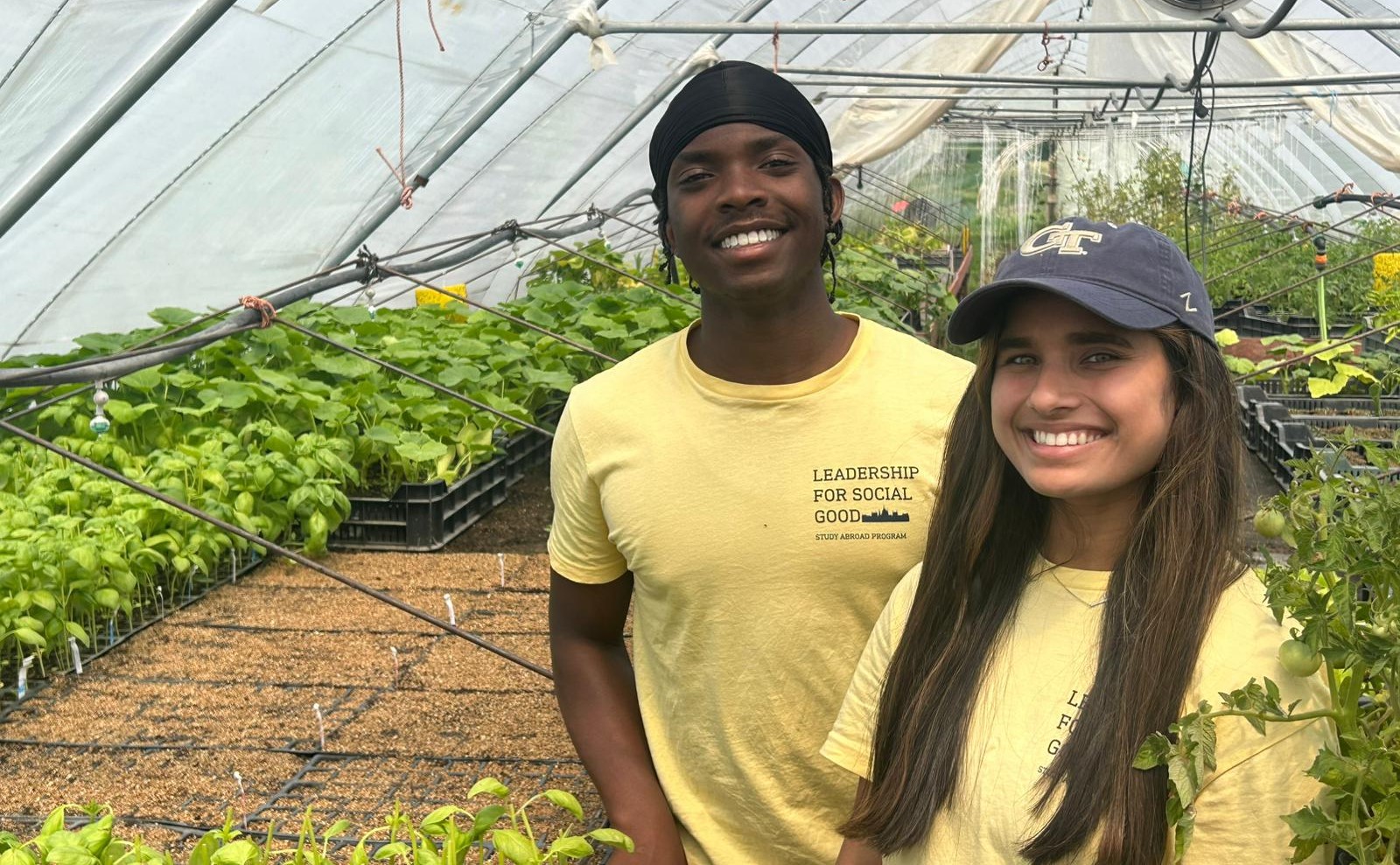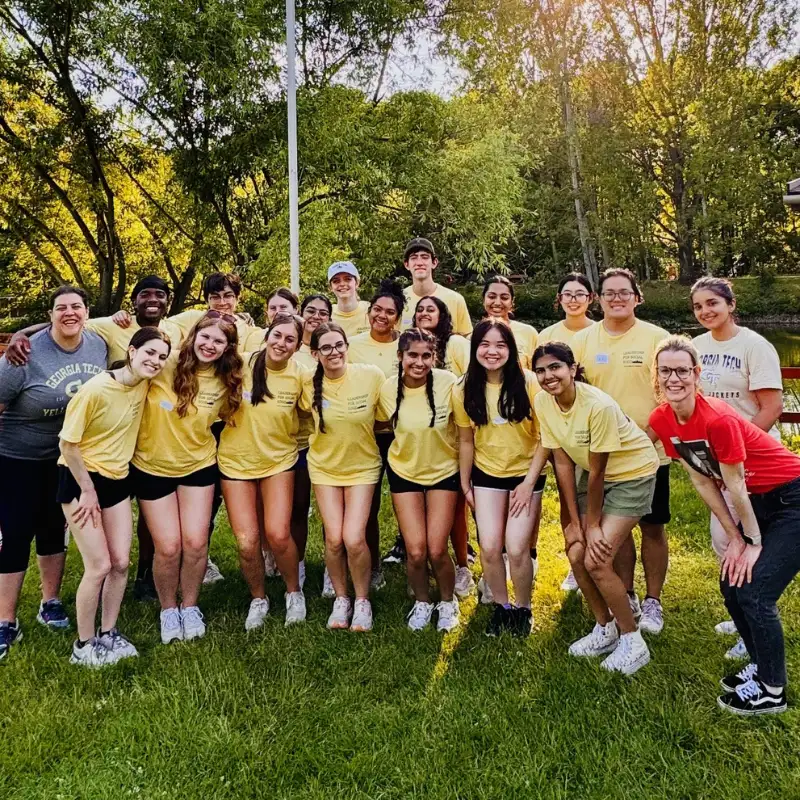This summer, 19 Georgia Tech students from across colleges and disciplines packed more than passports and power adapters—they carried with them a desire to lead with purpose. Through the Leadership for Social Good (LSG) Study Abroad Program, these students are spending their summer not only immersed in new cultures but also working shoulder-to-shoulder with Hungarian nonprofits tackling real social challenges.

LSG Study Aboard 2025 in Budapest
Organized by the Institute for Leadership and Social Impact in the Scheller College of Business, the program centers on immersive learning, professional identity development, and global collaboration—aligning directly with Georgia Tech’s mission to graduate students who will advance technology and improve the human condition.
After two weeks in Atlanta, where students studied the foundations of nonprofit strategy and learned from social sector leaders like Hands On Atlanta, Global Growers, and Goodr, the group—nicknamed The Budapest Express—traveled to Prague, Vienna, and Budapest to bring their learning to life.
In Budapest, students have been paired with one of nine community partners. From Bcorps to grassroots nonprofits, each partnership is unique—but all share a common goal: co-creating meaningful impact. Here's a glimpse of what these changemakers are building:
Beeco: Sonia Pahade (BSBA) and Ky Tran (CS) are conducting market and competitor research for this sustainability-focused app as it prepares for international growth.
Papírsárkány Gyermekalapítvány (Paperkite Childrens’ Foundation): Reese Baker (IE) and Maya Pandya (BSBA) are shaping the organization’s brand and storytelling strategy to support children in state care.
“Witnessing firsthand the impact of our efforts—and forming personal connections with the children—made my experience truly meaningful.” — Reese Baker
Autistic Art Foundation: Mallory Booth (BSBA) and Shriya Venkatesh (BSBA) are crafting digital content that highlights the artistic talents of youth with autism and enhances the nonprofit’s webshop.
“ Mallory and Shriya created something we've been dreaming about for years but haven't had the resources to realize. Their work is incredibly valuable to us!" - Anikó Ács (Autistic Art)
No Bad Kid (Pressley Ridge Foundation): Matty Hulbert (BSBA) and Noah O’Brien (BSPSYC) are piloting an educational game that reframes behavioral challenges through the lens of empathy and connection.
Tudatos Vásárlók Egyesülete (Association of Conscious Consumers): Amanda Zou (BSBA), Sandhya Rajesh (BSBA), and Ashmin Kaur (ECON) are bridging research and behavior change by analyzing data on consumer habits and sustainability.
Biofilter Zrt.: Keerthana Nagula (BSBA) and Sayler Davies (BSBA) are designing an outdoor educational space to teach youth about food waste and clean energy through the lens of the UN Sustainable Development Goals.
“We get to design an interactive garden...with painted compost bins and benches made from upcycled barrels. It’s such a creative way to teach climate-conscious habits to kids!” — Keerthana Nagula
Zsámboki Biokert (Cargonomia): Audrey Paikeday (BSBA) and Caleb Harris (ME) are launching social media strategies that promote regenerative farming and deepen consumer engagement.
“Interning with Zsámboki Biokert has broadened my perspective on food systems, degrowth, and sustainability.” — Audrey Paikeday
 Audrey Paikeday and Caleb Harris at Zsámboki Biokert site
Audrey Paikeday and Caleb Harris at Zsámboki Biokert site
Tűzcsiholó Egyesület (Firestarter Foundation): Lily Gao (BSBA) and Taylor Aycock (BSBA) are researching housing models to support families aging out of the foster care system—building cross-cultural bridges between Budapest and Atlanta.
Kompánia Alapítvány: Bailey Moffett (LMC) and Mario Lopez (BSBA) are leading sports and music activities with local youth, while contributing to the organization’s annual impact report.
“My work at Kompania helped me develop professionally by teaching me how to navigate cross-cultural barriers through communication.” — Mario Lopez
These student-led collaborations are more than class projects—they are deeply personal, often challenging, and always growth-filled experiences. As students step into unfamiliar environments and learn to navigate complex social issues, they are developing the very skills Georgia Tech prioritizes in its mission to develop leaders: empathy, critical thinking, adaptability, and intercultural agility.
This summer, community-based learning is supported by Georgia Tech’s Transformative Teaching and Learning Innovation (TTL) Incubator Grant.
The TTL initiative aims to create significant learning experiences that change the way students see the world,” said Kate Williams, the TTL faculty lead, "This study abroad program—immersive, global, and grounded in service—embodies this year's focus on community-based learning. These students are getting a unique 'hands-on and hearts-on' experience that will prepare them to make changes in communities at home and abroad.”
Follow their journey and reflections on the program blog.
The Leadership for Social Good Study Abroad Program is operated by the Institute for Leadership and Social Impact.
The Institute for Leadership and Social Impact (ILSI) is an interdisciplinary institute at Georgia Tech dedicated to promoting servant leadership and advancing organizational practices that contribute to a more just, caring, and sustainable world. Through experiential learning, research, and community partnerships, we nurture leaders who drive meaningful social change—locally in Atlanta and globally. To learn more about our initiatives and programs, visit our website.
